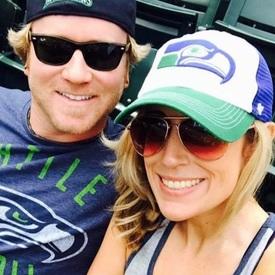Don't eyeball it

getfitmanuel
Posts: 22 Member
Got some measuring spoons today and realized my tablespoon of olive oil I've been using the past few weeks when cooking was actually about 2 or 3 tablespoons lol.
Morale of the story...
Get some measuring cups and spoons.
Morale of the story...
Get some measuring cups and spoons.
14
Replies
-
Better yet, get a food scale! Those measuring cups/spoons are still off 🤭29
-
msalicia07 wrote: »Better yet, get a food scale! Those measuring cups/spoons are still off 🤭
But spoons and cups for liquid. Like oil. Because the nutrition facts state serving size in ml, so I am going to measure in ml. Just like if the nutrition is in gm/oz I measure in those increments.10 -
Sure, use a food scale for solid things - but for things like olive oil, I would use a measuring spoon - easier than a food scale and a measured tablespoon is accurately a tablespoon
Plastic measuring spoon sets are a few dollars at supermarkets
8 -
youngmomtaz wrote: »msalicia07 wrote: »Better yet, get a food scale! Those measuring cups/spoons are still off 🤭
But spoons and cups for liquid. Like oil. Because the nutrition facts state serving size in ml, so I am going to measure in ml. Just like if the nutrition is in gm/oz I measure in those increments.
I save myself washing a spoon and use the USDA-based olive oil data entry that has a 100 gram serving size among its options. For nutritional purposes, olive oil is olive oil; no need to rely on the package label.17 -
msalicia07 wrote: »Better yet, get a food scale! Those measuring cups/spoons are still off 🤭
Yep, I am always shocked how off the measuring spoons and cups are. I love my scale and even have a traveling one in my bag 🤣8 -
Well, sounds like my spoons are already obsolete lol. I'll be using my kitchen scale from now on.20
-
For oil and ice cream 1 ml does not equal 1g. But conversion tables do exist (at least for olive oil) and so do gram based USDA entries. Between measures and eye balls being off and the scale already there and in use... what's an extra before and after for something as energy dense as oil...7
-
I use the cap.1
-
paperpudding wrote: »Sure, use a food scale for solid things - but for things like olive oil, I would use a measuring spoon - easier than a food scale and a measured tablespoon is accurately a tablespoon
Plastic measuring spoon sets are a few dollars at supermarkets
I find a food scale much handier even for liquids. Put the bottle on the scale, tare, pour and then put back the bottle. With measuring spoons I'm always wondering how full they should be.7 -
food scale for all solids, proper measuring cups and spoons for liquids. although MANY liquids (if not most, really.... if you look hard for them) will have an accurate database entry with the gram weight
3 -
Many food scales can switch between measuring mls, oz and grams. So I tend to use my food scale for all measurements, including liquids.4
-
SouthWestLondon wrote: »Many food scales can switch between measuring mls, oz and grams. So I tend to use my food scale for all measurements, including liquids.
And less dishes to do! Yay!4 -
I would never want to discourage anyone from measuring accurately, but after some years of logging I do eyeball things I eat daily (e.g. the oats and chia I soak to have with my yogurt). BUT every month or so I measure out a portion just to re-train my eye and check my accuracy. I am fussier about weighing and measuring foods that are calorie dense as a small slip could make a very meaningful calorie difference.8
-
I was actually doing the opposite haha. My 1 tbsp of oil was actually only about 0.5 tbsp. Oops.4
-
addicted2cola wrote: »I was actually doing the opposite haha. My 1 tbsp of oil was actually only about 0.5 tbsp. Oops.
I'd been doing the same with my coffee creamer.
On a side note, don't you love it when a TV chef says to add 2 tbsp of oil to a pan and then dumps in 6?!8 -
I try to weigh everything, but I do use a teaspoon for olive oil (I probably use a teaspoon of olive oil at least once a day.) I know it's not perfect, but because I still lose weight or maintain as I expect with my calorie intake, I'm comfortable that it is accurate enough not to be throwing me off.6
-
Thread reminder: scales measure weight regardless of scale setting.
Scales set 1ml = 1g, which is true for a majority of liquids at most locations and room temperatures.
However oil is not 1g per ml (fat content, fat floats on water)
Neither are whipped cream or ice cream (air content and fat)
So worth double checking conversion tables and entries9 -
Some items really beg for the scale. Foods like granola are calorie dense and can vary in texture (clumps vs. small pieces). With granola, I have found the per cup/tablespoon calories optimistically listed at almost half the more accurate gram measurement.3
-
What scale do you guys recommend? I need to buy one for the first time. I brand new to my weight loss journey.
0 -
mcaesar811 wrote: »What scale do you guys recommend? I need to buy one for the first time. I brand new to my weight loss journey.
A food scale that has the tare feature, weighs in grams and is large enough to hold a plate. Ideally one that is large enough that you can read the readout when you place a plate on it.2 -
lynn_glenmont wrote: »youngmomtaz wrote: »msalicia07 wrote: »Better yet, get a food scale! Those measuring cups/spoons are still off 🤭
But spoons and cups for liquid. Like oil. Because the nutrition facts state serving size in ml, so I am going to measure in ml. Just like if the nutrition is in gm/oz I measure in those increments.
I save myself washing a spoon and use the USDA-based olive oil data entry that has a 100 gram serving size among its options. For nutritional purposes, olive oil is olive oil; no need to rely on the package label.
Yes, I use the USDA-based olive oil data entry that has a 100 gram serving size as well.
I just use tablespoons for foods that aren't calorie dense, like vinegar or water.2 -
Thread reminder: scales measure weight regardless of scale setting.
Scales set 1ml = 1g, which is true for a majority of liquids at most locations and room temperatures.
However oil is not 1g per ml (fat content, fat floats on water)
Neither are whipped cream or ice cream (air content and fat)
So worth double checking conversion tables and entries
When using the scale to measure a liquid that is not water, not a commodity (like olive oil or a milk with some specific fat content, like 3.5% or 1% or nonfat, for which there are USDA database entries by weight), and which gives nutritional information on its package label by volume, I just multiply the weight in grams by 1.1 to estimate the volume in milliliters, as I have yet to see a potable liquid with a specific gravity below 0.9. I may be overestimating by at least a small amount most of the time, but it seems like a reasonably accurate, low-effort solution.0 -
paperpudding wrote: »Sure, use a food scale for solid things - but for things like olive oil, I would use a measuring spoon - easier than a food scale and a measured tablespoon is accurately a tablespoon
Plastic measuring spoon sets are a few dollars at supermarkets
I find a food scale much handier even for liquids. Put the bottle on the scale, tare, pour and then put back the bottle. With measuring spoons I'm always wondering how full they should be.
For liquids they should be level spoon - that is how measuring spoons are designed - 1 tspn is one level spoon of liquid.
So OP u can see there are different ways of doing things - if you use the spoon for the purpose they are designed- ie liquids, that will be quite workable.
or, if you prefer not to use them at all - then, don't.
0 -
L1zardQueen wrote: »mcaesar811 wrote: »What scale do you guys recommend? I need to buy one for the first time. I brand new to my weight loss journey.
A food scale that has the tare feature, weighs in grams and is large enough to hold a plate. Ideally one that is large enough that you can read the readout when you place a plate on it.
And that has enough positive weight capacity to weigh a large pan full of whatever (for recipe portioning), and that will display negative weights (for things like putting the peanut butter jar on the scale, taking some out with a knife, and noting the negative weight as the amount you took out).
I think it's a plus to have one that uses batteries you commonly keep around, or that is easily rechargeable. I had one that used some oddball size of button battery, and I'm much happier with one that uses AA, because I always have AA around for other stuff.6 -
mcaesar811 wrote: »What scale do you guys recommend? I need to buy one for the first time. I brand new to my weight loss journey.
This one was $13 works great- has been a game changer
1 -
mcaesar811 wrote: »What scale do you guys recommend? I need to buy one for the first time. I brand new to my weight loss journey.
This is the one I use: https://www.etekcity.com/product/100392
It's only $12 and is definitely getting the job done. I've had it maybe a week but it's been really helpful for accurate calorie counts! Even when I find out I had the right measurement before, it's really assuring to know that my past logs are accurate.1 -
SouthWestLondon wrote: »Many food scales can switch between measuring mls, oz and grams. So I tend to use my food scale for all measurements, including liquids.
The milliliters by weight is only accurate for water as other liquids have a different density therefore weigh a different amount per milliliter. Most (all?)kitchen scales aren't smart enough to compensate for different density liquids.1 -
Thanks everyone!1
This discussion has been closed.
Categories
- All Categories
- 1.4M Health, Wellness and Goals
- 398.5K Introduce Yourself
- 44.7K Getting Started
- 261K Health and Weight Loss
- 176.4K Food and Nutrition
- 47.7K Recipes
- 233K Fitness and Exercise
- 462 Sleep, Mindfulness and Overall Wellness
- 6.5K Goal: Maintaining Weight
- 8.7K Goal: Gaining Weight and Body Building
- 153.5K Motivation and Support
- 8.4K Challenges
- 1.4K Debate Club
- 96.5K Chit-Chat
- 2.6K Fun and Games
- 4.8K MyFitnessPal Information
- 18 News and Announcements
- 21 MyFitnessPal Academy
- 1.5K Feature Suggestions and Ideas
- 3.2K MyFitnessPal Tech Support Questions





















